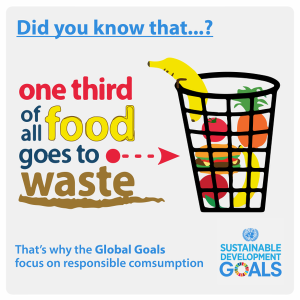UN Sustainable Development Summit 2015
Food
- While substantial environmental impacts from food occur in the production phase (agriculture, food processing), households influence these impacts through their dietary choices and habits. This consequently affects the environment through food-related energy consumption and waste generation.
- 3 billion tonnes of food is wasted every year while almost 1 billion people go undernourished and another 1 billion hungry.
- Overconsumption of food is detrimental to our health and the environment.
- 5 billion people globally are overweight or obese.
- Land degradation, declining soil fertility, unsustainable water use, overfishing and marine environment degradation are all lessening the ability of the natural resource base to supply food.
- The food sector accounts for around 30 per cent of the world’s total energy consumption and accounts for around 22 per cent of total Greenhouse Gas emissions.
Water
- Less than 3 per cent of the world’s water is fresh (drinkable), of which 2.5 per cent is frozen in the Antarctica, Arctic and glaciers. Humanity must therefore rely on 0.5 per cent for all of man’s ecosystem’s and fresh water needs.
- Man is polluting water faster than nature can recycle and purify water in rivers and lakes.
- More than 1 billion people still do not have access to fresh water.
- Excessive use of water contributes to the global water stress.
- Water is free from nature but the infrastructure needed to deliver it is expensive.
http://www.un.org/sustainabledevelopment/sustainable-consumption-production/

Leave a Reply